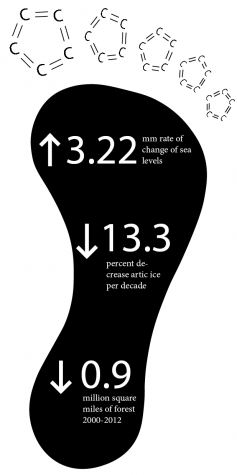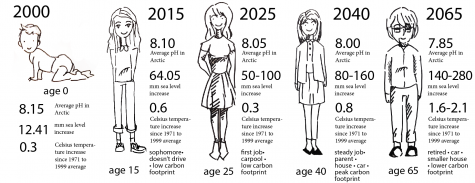Global reset: facing our future
Climate change redefines our world
In a survey for the first issue of the Winged Post, we asked freshmen which global phenomenon would most affect their adulthood. One response was climate change.
According to NASA, global carbon dioxide emissions are increasing exponentially, global temperatures are steadily rising and the expanse of arctic ice is decreasing.
The intersection between science, technology, math and engineering is at the forefront of and crucial to solving these environmental issues for future generations.
In each issue of the paper, we will address the issue of climate change and how it pertains to the Harker community, talking about its impacts on the environment, the challenges researchers face in solving it and promising solutions.

This infographic depicts the negative environmental effects of climate change. Forest coverage and arctic ice coverage are decreasing significantly annually and the average sea level is steadily rising.
This issue, we introduce the history of climate change and provide a context of how the environment has changed, is changing and will change. We step into the life of a typical sophomore at Harker, born in 2000, and see how the environment has changed and will change over the course of that student’s life, using the ages of zero, 15, 25, 40 and 65.

This infographic depicts the development of someone’s carbon footprint and the changes in the environment throughout her life.
In the Winged Post version of this article published on Oct. 16, 2015, information on emissions, temperature and arctic ice in the article text and infographics was not properly attributed to NASA. The online version published on Oct. 18, 2015 now reflects this change.

Vineet Kosaraju (12) is the STEM Editor for both Harker Aquila and Winged Post. He is a senior and has been part of the journalism program for the past...

Sahana Srinivasan (12) is the Editor-in-Chief of the Winged Post and Wingspan, having previously served as Managing Editor, Asst. STEM Editor and a reporter....




![LALC Vice President of External Affairs Raeanne Li (11) explains the International Phonetic Alphabet to attendees. "We decided to have more fun topics this year instead of just talking about the same things every year so our older members can also [enjoy],” Raeanne said.](https://harkeraquila.com/wp-content/uploads/2025/10/DSC_4627-1200x795.jpg)


















![“[Building nerf blasters] became this outlet of creativity for me that hasn't been matched by anything else. The process [of] making a build complete to your desire is such a painstakingly difficult process, but I've had to learn from [the skills needed from] soldering to proper painting. There's so many different options for everything, if you think about it, it exists. The best part is [that] if it doesn't exist, you can build it yourself," Ishaan Parate said.](https://harkeraquila.com/wp-content/uploads/2022/08/DSC_8149-900x604.jpg)




![“When I came into high school, I was ready to be a follower. But DECA was a game changer for me. It helped me overcome my fear of public speaking, and it's played such a major role in who I've become today. To be able to successfully lead a chapter of 150 students, an officer team and be one of the upperclassmen I once really admired is something I'm [really] proud of,” Anvitha Tummala ('21) said.](https://harkeraquila.com/wp-content/uploads/2021/07/Screen-Shot-2021-07-25-at-9.50.05-AM-900x594.png)







![“I think getting up in the morning and having a sense of purpose [is exciting]. I think without a certain amount of drive, life is kind of obsolete and mundane, and I think having that every single day is what makes each day unique and kind of makes life exciting,” Neymika Jain (12) said.](https://harkeraquila.com/wp-content/uploads/2017/06/Screen-Shot-2017-06-03-at-4.54.16-PM.png)








![“My slogan is ‘slow feet, don’t eat, and I’m hungry.’ You need to run fast to get where you are–you aren't going to get those championships if you aren't fast,” Angel Cervantes (12) said. “I want to do well in school on my tests and in track and win championships for my team. I live by that, [and] I can do that anywhere: in the classroom or on the field.”](https://harkeraquila.com/wp-content/uploads/2018/06/DSC5146-900x601.jpg)
![“[Volleyball has] taught me how to fall correctly, and another thing it taught is that you don’t have to be the best at something to be good at it. If you just hit the ball in a smart way, then it still scores points and you’re good at it. You could be a background player and still make a much bigger impact on the team than you would think,” Anya Gert (’20) said.](https://harkeraquila.com/wp-content/uploads/2020/06/AnnaGert_JinTuan_HoHPhotoEdited-600x900.jpeg)

![“I'm not nearly there yet, but [my confidence has] definitely been getting better since I was pretty shy and timid coming into Harker my freshman year. I know that there's a lot of people that are really confident in what they do, and I really admire them. Everyone's so driven and that has really pushed me to kind of try to find my own place in high school and be more confident,” Alyssa Huang (’20) said.](https://harkeraquila.com/wp-content/uploads/2020/06/AlyssaHuang_EmilyChen_HoHPhoto-900x749.jpeg)



